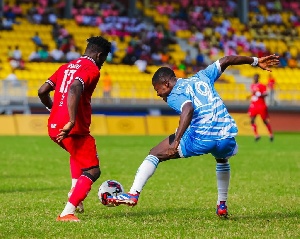- Home - News
- Elections 2024
- News Archive
- Crime & Punishment
- Politics
- Regional
- Editorial
- Health
- Ghanaians Abroad
- Tabloid
- Africa
- Religion
- Photo Archives
- Press Release
Health News of Thursday, 5 June 2025
Source: www.ghanawebbers.com
Heat Exhaustion: Causes, Symptoms & Prevention
Understanding Heat Exhaustion
Heat exhaustion occurs when your body overheats. This happens when you lose too much water and salt, usually from sweating. It can occur during outdoor work or exercise on hot days. Spending time in hot places, like a non-air-conditioned home, can also cause it.
Heat exhaustion is one of three major heat-related illnesses. The other two are heat cramps and heat stroke. Heat cramps are less serious, while heat stroke is the most severe. These conditions can progress from one to another.
Heat Exhaustion vs. Heat Stroke
Heat exhaustion and heat stroke are related but different conditions. If you have heat exhaustion symptoms and don’t cool down quickly, you may develop heat stroke. Heat stroke is very serious and can be deadly. It may cause permanent damage to your brain and vital organs.
If you see signs of heat stroke, call 911 immediately. Symptoms include:
- Body temperature at or above 104°F
- Confusion or agitation
- Hallucinations
- Slurred speech
- Fainting
- Inability to sweat
Is Sunstroke the Same as Heat Stroke?
Yes, sunstroke is another name for heat stroke.
Symptoms of Heat Exhaustion
Symptoms of heat exhaustion can appear suddenly or gradually. Early signs may include a red rash or painful cramps in arms and legs. Once it sets in, symptoms may include:
- Body temperature over 100°F (normal temperature possible)
- Dizziness or faintness
- Cool, moist skin with goosebumps
- Blurred vision
- Fatigue
Other symptoms include headache, nausea, heavy sweating, rapid heartbeat, shallow breathing, swollen ankles or hands, and low blood pressure when standing.
Symptoms of Heat Exhaustion in Babies
Babies are at high risk for heat illnesses like heat exhaustion and stroke. They sweat less than adults and can't communicate how they feel. Signs of heat exhaustion in babies might include:
- Paler skin than usual
- Cooler skin
- Increased thirst
- Less urination or crying
- Rise in body temperature
What Causes Heat Exhaustion?
Sweat helps cool your body by evaporating off your skin. However, high humidity slows this process down. When active in hot weather, you sweat more and lose fluids and minerals like sodium and potassium.
The risk of heat-related illness increases significantly when the heat index reaches 90°F or higher. During a heat wave, pay attention to the reported heat index.
Treatment for Heat Exhaustion
If you experience symptoms of heat exhaustion:
1. Get out of the heat immediately.
2. Rest in an air-conditioned room if possible.
3. If not indoors, find a cool shady spot.
4. Drink water or sports drinks slowly; avoid caffeine and alcohol.
5. Remove tight clothing.
6. Take a cool shower or bath.
7. Use fans or ice towels for cooling.
If symptoms do not improve within an hour, seek medical help right away to prevent progression to heat stroke.
In cases of suspected heat stroke, emergency treatment may involve ice baths or cooling blankets.
Recovery Time from Heat Exhaustion
Heat exhaustion typically resolves with rest and hydration within an hour. However, sensitivity to high temperatures may last for about a week after recovery.
Avoid hot weather and heavy exercise until your doctor says it's safe to resume normal activities.











